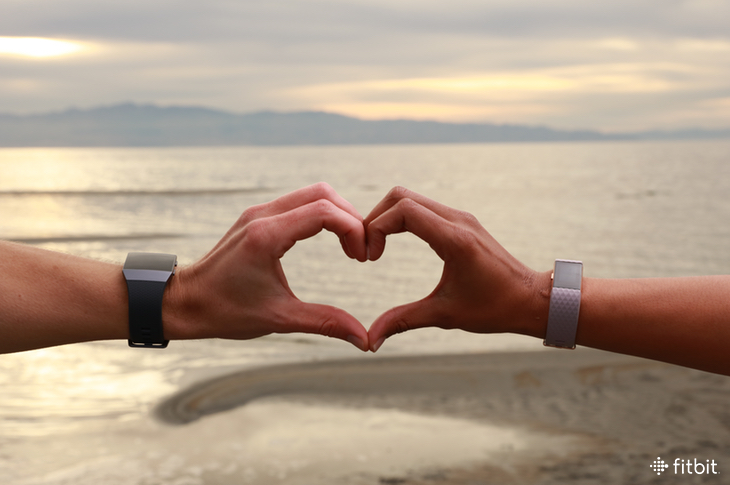
Fitbit Hearts Your Heart—Here’s Why
Your heart is at the, well, heart of everything you do. By pumping nutrient and oxygen-rich blood throughout your body, it powers everything from your brain to your gut to your little pinky toe. You simply cannot be at your best without a healthy heart. That’s why Fitbit has invested so heavily in tools and sensors, such as its PurePulse continuous heart rate technology, that can help you impact your heart health.
Already own a Fitbit device with PurePulse? Awesome! If not, that’s OK, too. There are a ton of ways you can help keep your ticker in tip-top shape with or without a heart-rate-tracking device.
Below, a compilation of Fitbit’s favorite heart-health tips, advice, and success stories so you can spend Heart Health Month (and beyond!) showing your most important organ some love.
Strengthen Your Heart

If even the thought of stepping on a treadmill makes you cringe, get excited: Researchers say you can count any kind of physical activity toward your daily exercise goal, meaning cardio machines and pricey gym memberships are totally optional. For the full details, read: Improve Your Heart Health Without Running a Marathon.
 In addition to torching tons of calories, jumping rope improves coordination, burns fat, and works your arms, legs, and core at the same time. For a jump-rope workout you can do anywhere, read: This Jump Rope Workout Torches Mega Calories.
In addition to torching tons of calories, jumping rope improves coordination, burns fat, and works your arms, legs, and core at the same time. For a jump-rope workout you can do anywhere, read: This Jump Rope Workout Torches Mega Calories.

Maximum heart rate naturally declines with age. What does that mean for you and your running performance? To find out, read: Getting Older Affects Your Max Heart Rate (But That’s OK!)
Nourish Your Heart

Other healthy eating trends may come and go, but the Mediterranean diet is here to stay. Why? With a focus on colorful plants and healthy fats, many studies confirm it can help reduce your risk for chronic diseases, including heart disease, type II diabetes, and cancer. For a Mediterranean-inspired meal plan, featuring colorful veggies, healthy fats, and sunny flavors, read: Mediterranean Meal Plan: 5 Dinners with Sunny Flavors.

Concerned about heart disease, or simply aiming for improved health? Smart choices make a big difference. To discover which superfoods do the most for your heart, read: 12 Heart-Healthy Foods to Add to Your Grocery Cart.

Despite what anti-carb diets might lead you to believe, whole grains deserve a regular spot on your plate. For nine super options, plus tasty ways to try them, read: 9 Healthy Whole Grains.
Soothe Your Heart
 You probably know that taking certain healthy measures can help keep your ticker in tip top shape, but according to a recent advisory from the American Heart Association (AHA), the very same steps that protect your heart may also foster optimal brain function. To learn what they are, read: 7 Easy Steps to Help Keep Your Heart (and Brain!) Healthy.
You probably know that taking certain healthy measures can help keep your ticker in tip top shape, but according to a recent advisory from the American Heart Association (AHA), the very same steps that protect your heart may also foster optimal brain function. To learn what they are, read: 7 Easy Steps to Help Keep Your Heart (and Brain!) Healthy.

Headaches, jaw pain, neck ache. If you regularly experience symptoms like these, stress may be getting the best of you. To learn a nearly 100-year-old relaxation technique that can help melt away stress in minutes, read: The 10-Minute Relaxation Technique for Total-Body Calm.
 Breathing: It sounds easy enough, but you’d be amazed how many people do not breathe correctly throughout the day, and are reluctant to spend a just a little bit of time focusing on it. To learn how to stay centered—and lower your stress levels —using breathing techniques, read: Stressed? Get Calm in Seconds with These Breathing Tricks.
Breathing: It sounds easy enough, but you’d be amazed how many people do not breathe correctly throughout the day, and are reluctant to spend a just a little bit of time focusing on it. To learn how to stay centered—and lower your stress levels —using breathing techniques, read: Stressed? Get Calm in Seconds with These Breathing Tricks.
Track Your Heart

How fit is your heart? Get an idea using Fitbit’s version of an expert-recommended cardiorespiratory test. To learn more read: The Simple Fitbit Fitness Check That Can Help You Understand Your Heart.
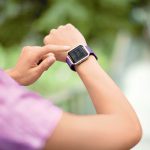
Your resting heart rate may not be a number you think about very often, but it should be! Not only can your resting heart rate be used to help track your fitness level and target your workouts, but it can also alert you to a variety of potential health issues. To learn more, read: 6 Things Your Resting Heart Rate Can Tell You About Your Health.

There are lots of numbers that can tell you a something about your health, but two of the most common are resting heart rate and blood pressure. To learn exactly what those two seemingly-similar readings are, and why they’re so important, read: What’s the Difference Between Resting Heart Rate and Blood Pressure?
Get Inspired

Pat originally bought a Fitbit tracker to keep her motivated to move, but she says paying attention to her resting heart rate data helped save her life. Read Tracking My Heart Rate Helped Save My Life: One Woman’s Incredible Story to learn more about her Pat’s story!

After a heart health scare at age 55, Dennis knew he needed to make some lifestyle changes. Discover how he now uses his Fitbit Charge 2 to log a whole lot of miles in his story: Heart Health is a Marathon for This Fitbit User, Not a Sprint.

After years of extreme weight fluctuations, Mary was at her highest weight—300 pounds—when her father was diagnosed with type II diabetes. To find out how she lost 130 pounds—and kept it off, read: For Weight Loss, This Woman Found the Third Time Was the Charm.
Shop Fitbit Products with PurePulse Now!
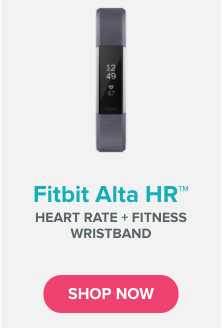
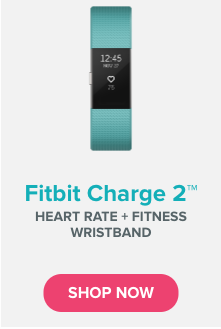
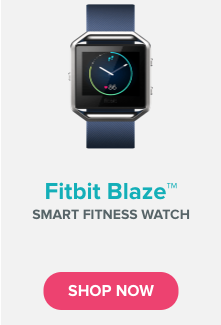
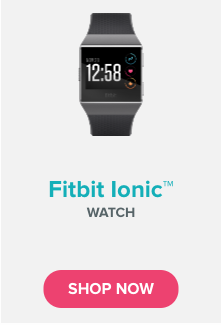
Every health and fitness journey is unique. The people featured here used Fitbit to help motivate them to make changes in their activity and diet that led to improvements in their wellness. Always check with your doctor before changing your diet, altering your sleep habits, or starting a new fitness routine. The Fitbit wristbands featured here are motivational tools and are not intended to diagnose or treat a health problem or condition.
This information is for educational purposes only and is not intended as a substitute for medical diagnosis or treatment. You should not use this information to diagnose or treat a health problem or condition. Always check with your doctor before changing your diet, altering your sleep habits, taking supplements, or starting a new fitness routine.
Hullo. Could you please let me know if you have a device or an App that can detect Atrial fibrillation. I am interested in purchasing such a device
Yes all of the Fitbits are really really good
I have an Alta HR and the watch works fine. The problem is I can not get all my info (ie: my sleep cycles,etc) on my iPad. I get it on my iPhone but not my iPad. I used to have a regular HR and had no problem getting ALL info on the iPad. How do I rectify this problem?
Thanks,
VICTORIA Thomas
Last year I suffered a cardiac arrest at 45 (turns out its a genetic thing), I purchased a Alta HR to keep on eye on my heart rate. For the most part it is ok but the screen only stays on for 2 seconds at a time. This is useless when you are exercising. You have to slow down to get a look at the watch. It defeats the purpose. Garmins have HR and display doesn’t go off. So I am disappointed with the fitbit Alta HR, will probably give it to my kid and get myself a garmin.
After years of being really careful I lost my Fitbit One. Now I find you no longer make that product. I really don’t want something I have to wear on my wrist, so my question is, will you be replacing that with an updated version that is a clip on rather than a wrist band? Someone gave me one but still prefer the One. Found one on Amazon and the seller is asking 288.00.
I read with interest that I can some how program in snowshoeing to my charge 2 !! Please tell me how , as it is my fav winter activity on our country acreage
Yes